To get to know our Scholars even better, watch them discuss their Beckman Scholars experience on our videos page!
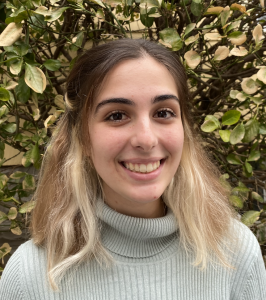 Lindsay Diab
Lindsay Diab
Majors: Math and Biology
Graduation: Spring 2024
About Me: I’m interested in genetics and molecular biology, specifically looking at DNA fragility and potential applications to cancer research. I hope to pursue a Ph.D. in molecular biology after my time at Tufts and eventually conduct research as a career. When not in the lab, I love to bake, read, and I am very active in both student and department theater at Tufts.
Research Project: FRA16D is a common fragile site within the WWOX tumor suppressor gene in humans. Flex1 is a region of DNA within FRA16D that has been shown to cause fragility at FRA16D and is polymorphic for an (AT) repeat. (AT)34 forms a secondary cruciform structure in Flex1 and stalls DNA replication. The aim of my project is to determine how Mph1, a DNA helicase in S. cerevisiae, prevents fragility at Flex1 (AT)34. Understanding the ways a cell overcomes replication stalls at Flex1 (AT)34 could provide insight into potential cancer therapeutics down the line, as FRA16D is a site of mutations and translocations in many different types of cancer cells.
Arya Patel
Majors: Biochemistry and Community Health
Graduation: Spring 2024
About Me: Currently, I am interested in neurobiology and the chemical mechanisms which underlie the process of learning and memory formation. In pursuit of a career as a physician-scientist, I am motivated by the prospect of uncovering targets for therapeutic intervention. Outside of the lab, I volunteer at Tufts EMS and enjoy skiing in my free time.
Research Project: Post-transcriptional modifications to transfer RNA (tRNA) nucleosides fine-tune tRNA structure and folding to facilitate amino acid charging and codon recognition. In response to conditioned electrical shock stimulation, multiple neuronal tRNA modifications have been found to prompt the synthesis of learning and memory-related proteins. My project aims to clarify the role of tRNA modifications in behavioral sensitization. By developing a protocol that quantifies both tRNA copies and modification abundance, I can determine whether the observed changes in neuronal translation regulation are due to increased tRNA expression or the modification of hypo-modified tRNAs.
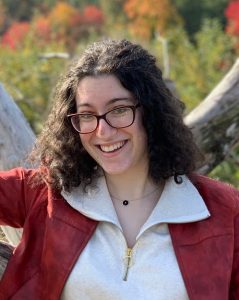 Leah Slepoi
Leah Slepoi
Majors: Biology
Graduation: Spring 2023
About Me: I am interested in genetics and molecular biology, especially in clarifying the causes and pathways of DNA damage and repair. My hope is that there will always be something new to learn and uncover. I plan to continue with research by pursuing a Ph.D. after finishing my time at Tufts.
Research Project: Trinucleotide repeat sequences (TNRs) in DNA are prone to increased fragility (breakage) and instability (expansions and contractions of the repeat). Fragility and instability increase when there are more transcription-replication conflicts (TRCs), or the convergence of transcription and replication forks. My project aims to determine which nuclease(s) are the cause of the increased fragility and instability at CAG repeats with increased TRCs. Further characterizing the pathways leading to damage at TNRs could be vital in the study of various genetic diseases, including Huntington’s disease.
Stefan Hansel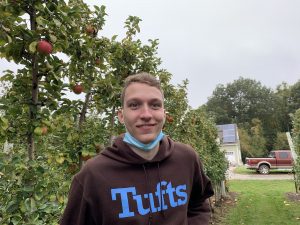
Majors: Biochemistry and Biotechnology
Graduation: Spring 2023
About Me: I’m most interested in discovering and learning the detailed chemical mechanisms that explain the processes occurring in our bodies. I’m aiming to join a Ph.D. program, and my dream is to become a professor one day. I also enjoy studying and practicing German for my minor, and outside of classes, I love to play volleyball with my club team and relax with some video games.
Research Project: My project aims to bring a better mechanistic understanding to the chemical process of glycation. Glycation is a non-enzymatic post-translational modification that has been linked to many diseases, and forms a diverse collection of possible advanced glycation end-products (AGEs). Due to its non-enzymatic nature and the variety of the products that form, there is a lack of mechanistic understanding in the field of glycation. I aim to synthesize isotopically labeled methylglyoxal (MGO), a common reactant of glycation, for mechanistic studies. I will then track which atoms of the MGO end up in specific AGEs and perform kinetic isotope effect experiments to deduce the mechanisms governing the formation of specific AGEs.
 Mia Chung
Mia Chung
Majors: Biology and English
Graduation: Spring 2022
About Me: I am interested in chemical biology and biomedicine, and eventually, I would like to pursue a Ph.D. in biochemistry with a focus on drug development. As a double biology and English major, I am passionate about effective and engaging scientific communication, and I love to explore the intersection between the sciences and humanities.
Research Project: My project explores binding patterns of a synthetic peptide library designed to selectively inhibit the protein GABARAP. GABARAP is one member of an important family of proteins which regulate autophagy, a cellular degradation pathway. To do this, I am measuring the binding affinities of the optimized peptides to all six members of this protein family. Understanding the specificity of these peptides could allow us to adapt them into drug-like molecules targeting the autophagy pathway.
Tara Lowensohn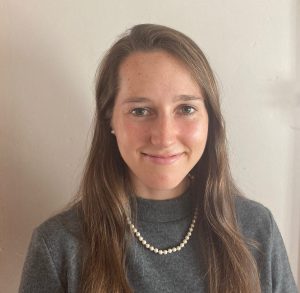
Major: Biochemistry
Graduation: Spring 2022
About Me: I enjoy working at the intersection of chemistry and biology to rationally design drugs against infectious diseases. I am eager to pursue a Ph.D. in chemical biology. Outside of the lab, I love cooking, spending time in the outdoors, and running with the Tufts Track & Field and Cross Country teams.
Research Project: Tuberculosis (TB) is the deadliest infectious disease in the world. The rise of multi-drug resistant strains of Mycobacterium tuberculosis (M. tb), the causative agent of TB, warrants the pressing need for new anti-TB drugs. My project investigates proteins called inteins as an underexplored anti-TB drug target. The goal of my project is to inhibit the conserved intein splicing process in three M. tb proteins with a single agent. Discovery of lead compounds that effectively inhibit intein splicing could unlock a new class of antimycobacterial agents to combat M. tb and aid the worldwide effort against these superbugs.
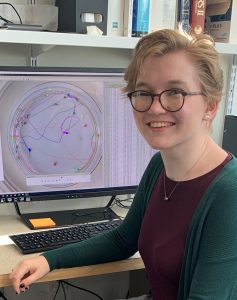 Katharine Bowers
Katharine Bowers
Major: Biology Minor: Computer Science
Graduation: Spring 2022
About Me: I am interested in the intersection between biology and computer science, and particularly enjoy coding tools to enhance my biology research and analysis. I love to learn about developmental and computational biology, and I am passionate about science communication. In the future, I am interested in pursuing a Ph.D. combining biology and computer science.
Research Project: My research studies a novel finding that normal Xenopus laevis embryos attack deformed tadpoles housed in the same dish, a phenomenon we call “tadpole bullying.” I am studying this effect and identifying the key body features that signal deformity to normal tadpoles, as well as the mechanisms by which deformity is identified. I have built an analytical pipeline to quantify and analyze this behavior in videos of interacting tadpoles. Understanding tadpole bullying will make inroads into our understanding of how animals ascertain correct shape and function in themselves and others.
Kevin Schult
Major: Biochemistry
Graduation: Spring 2022
About me: I’m interested in using theoretical chemistry, machine learning, and molecular dynamics simulations to predict conformational behavior in proteins and small peptides. I’d like to eventually pursue a Ph.D. in computational chemistry and pursue a career in drug discovery research. In my free time, I read fantasy novels, and I’m active in student theater.
Research Project: My project aims to develop a novel, pharmaceutically viable inhibitor for the enzyme TACE, which produces TNF-alpha, a signaling molecule implicated in overactive inflammation for patients with wide-ranging disease states from arthritis to cancer. To do so, I am designing a small cyclic peptide that mimics a crucial interacting loop between TACE and one of its natural inhibitors, such that my peptide will produce a similar inhibitory effect while being more specific and bioavailable than known inhibitors.
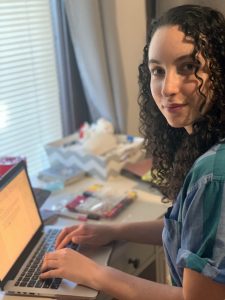 Sarah Shnayder
Sarah Shnayder
Majors: Biochemistry, Music
Graduation: Spring 2020
About me: I am interested in immunology, genetics, and biochemistry, and I have been fortunate enough to explore multiple scientific areas during my time conducting research at Tufts. I have narrowed down my focus to studying the effects of the gut microbiome and hope to continue this route as I pursue my goal of becoming a physician-scientist.
Research Project: My project explores the ability of the commensal bacteria P. dist to improve health-span and extend mean lifespan in a Drosophila model. I am exploring the mechanism behind this effect, which I hypothesize is related to reduced colonic inflammation and hyperplasia. Increased cellular health along the gut barrier would preserve gut barrier integrity with age, and ultimately reduce the incidence of disease.
 Aidan Fike
Aidan Fike
Majors: Computer Science and Physics
Graduation: Spring 2020
About Me: I am interested in using computation as a tool for modeling complex chemical processes. I feel that physics-based simulations and various visualization techniques can give me a deeper understanding of core scientific principles. My current research is in modeling and understanding small chemicals, but I can see my future career going in several different directions.
Research Project: Cyclic peptides are a promising class of drug molecules, but their sequence–structure relationships are still not well understood. It is currently possible to calculate the conformations that a single cyclic peptide will take, but unfortunately, this method requires a large amount of computational power. To decrease the complexity of this problem, I am developing a machine-learning algorithm to help predict the structural ensemble of a given cyclic peptide with reduced computational cost. Optimally, this algorithm will be useful for efficient drug design using cyclic peptides.
Eriko Koide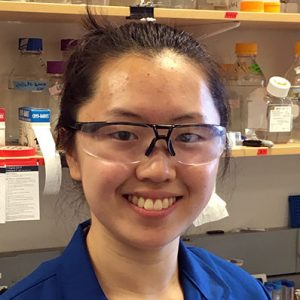
Major: Biochemistry
Graduation: Spring 2019
About Me: I am interested in investigating cellular processes that underlie fundamental biological functions and how they can be altered in the development of disease. I am interested in chemical biology, cellular biology, and immunology-based approaches to investigating these processes. I hope to further my research by pursuing a Ph.D. in one of these areas.
Research Project: Phosphotyrosine recognition domains are found in a large number of proteins that participate in many signaling networks in the human body. These domains are attractive targets for developing inhibitors, which could serve as therapeutic and investigative probes. However, phosphotyrosine itself is poorly cell-permeable, so it is necessary to develop minimally charged phosphotyrosine mimetics. To do this, I designed molecular mimics of a loop sequence of the human protein SHP2. SHP2 has an autoinhibited form with a loop binding its catalytic domain, and the loop may be binding by mimicking phosphotyrosine. This suggests the loop sequence could be harnessed as the basis for designing an SHP2 inhibitor. This would be the first report of the use of a naturally occurring autoinhibitory loop sequence to inhibit a protein tyrosine phosphatase.
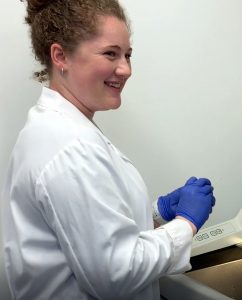 Hannah Vigran
Hannah Vigran
Major: Biology
Graduation: Spring 2020
About Me: As a kid, my favorite phrase was “what if”. I could take any question and spin it in a thousand different directions. So it’s no surprise that, at Tufts, I have found that I am learning much more in the research lab than in a traditional classroom setting! Currently, I am interested in studying development and regeneration in complex systems.
Research Project: I study limb regeneration in Xenopus frogs to learn lessons on how these amazing creatures can regenerate. I am also applying lessons learned in frogs to mammalian systems to see to what extent regeneration can be promoted in a non-regenerating animal.
Nile Abularrage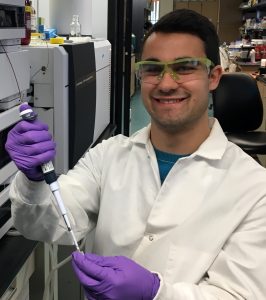
Major: Biochemistry
Expected Graduation: Spring 2018
About Me: I am interested in developing chemical techniques that give us a deeper understanding of biology. To do this, I would like to continue developing selective chemical probes to perturb and study biological systems. I plan to pursue a Ph.D. in chemistry or chemical biology to further my understanding of chemical methods development and protein chemistry.
Research Project: Phosphorylation is a post-translational modification to proteins that has roles in signaling and regulation. Phosphorylation is both transient and non-stoichiometric, which means phosphorylated proteins can be in relatively low abundance in the cell. This low abundance, coupled with the fact that phosphorylation makes proteins more difficult to study with mass spectrometry, means that new methods are necessary to understand serine/threonine phosphorylation on a proteome-wide scale. My project aims to selectively modify proteins containing phosphate with chemical handles that can be used to separate these proteins from other cellular proteins. This will enable enrichment of phosphorylated proteins and allow more comprehensive, proteomic mass spectrometry studies. With this tool in hand, phosphorylation events corresponding to disease states will be uncovered which will reveal potential drug targets.
Jessica Dabrowski
Majors: Chemistry, Environmental Science
Graduation: Spring 2017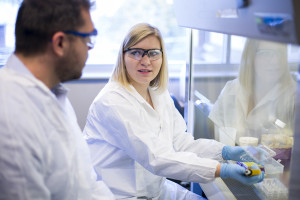
About Me: I have always been interested in studying the environment, especially in ways that will protect it and remediate the damage caused by humans. I plan to use the skills and experience I am building in chemistry to study the environment in a different way than it is often presented in class. I want to focus on what is happening at the molecular level to understand how ecosystems operate on the organismal level, rather than observing changes in the environment and inferring the causes. I am currently conducting research in analytical chemistry, and hope to continue chemistry research through graduate school and beyond to ultimately become an expert in environmental chemistry.
Research Project: In Iceland are approximately 100-meter deep lakes present underneath glaciers atop active volcanoes. Bacteria have been found to exist in these isolated environments with little to no exposure to oxygen or sunlight. The goal of this project is to find the detailed chemical composition of the lake to understand the energy cycles of these unusual organisms. The project will consist of building an array of sensors to conduct measurements in the environment, rather than from extracted samples to preserve the chemistry of the solution, as the sample can change when it is removed from the lake and sent to a lab. Challenges of this project include calibrating the sensors to work under high pressures and finding a reliable way to sense sulfur species, compounds especially of importance in chemosynthetic metabolisms. The chemical will describe the type of environment these organisms live in and what energy sources are present. Since this ecosystem is isolated from sunlight and from oxygen, it may be a good model for the environment of early Earth and of extraterrestrial environments.
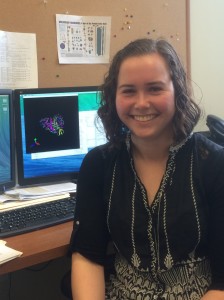
Julia Rogers
Majors: ACS Chemistry, Biotechnology
Graduation: Spring 2016
About Me: I am interested in elucidating the chemical principles essential to understanding the structure and function of biological molecules with computational modeling and simulation. I plan to continue research in computational chemistry while working towards a Ph.D. and ultimately aspire to conduct research at the interface of chemistry and biology with the potential to impact the ways we utilize biotechnology and treat disease.
Research Project: Glycosylation is a common covalent modification on more than half of all proteins. Glycosylation occurs in many different combinations of sugars and linkages, greatly enhancing the diversity of protein chemistries, structures, and functions. In general, glycoproteins must be properly glycosylated to achieve their full bioactivity; altered glycosylation is linked to the pathophysiology of diseases ranging from cancer to rheumatoid arthritis. Currently, the impact of glycosylation on protein structure is poorly understood and difficult to predict. Although specific protein-sugar interactions are believed to contribute to structural stability, very few universal interaction patterns have been identified. I am utilizing structural bioinformatics to discern protein-sugar interactions that contribute to structural stability. Molecular dynamics simulations will be utilized to quantify the protein-sugar energetics. Molecular-level knowledge of how sugars mediate protein structure will further our understanding of the intrinsic biophysical properties of glycoproteins and will enable glycosylation to be used to engineer novel protein structures and functions.

Maya Emmons-Bell
Major: Biology
Graduation: Spring 2016
About Me: Although I have always been fascinated by living things, my desire to pursue research as a career has been cemented during my time at Tufts. Embarking on an independent research project in the fields of developmental and regenerative biology has shown me how exciting and deeply fulfilling scientific discovery can be. In the future, I hope to earn a Ph.D. in biology, and then begin a career in biological research.
Research Project: My project has focused on exploring information storage in biological systems, involving integration of genotype, phenotype, environment, and developmental history. Specifically, I am interested in complex phenotypes, like head shape or resilience to an environmental insult, in the planarian flatworm. The influence of bioelectricity on the anterior/posterior patterning of the planarian has been thoroughly characterized, but my project represents the first time bioelectricity has been implicated in the production of shape. I am also investigating the robustness of bioelectric homeostases after exposure to environmental insults, like an ion channel blocker. Overall, my project is unique in its approach to high-level questions about biological information storage and organization. Exploring complex systems like regeneration, development, and oncogenesis with attention to epigenetic, environmental, bioelectric, and physiological sources of information will add to medicine, engineering, and an overall understanding of the complexity of life.
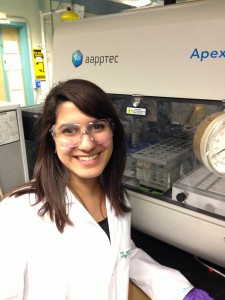
Sara Khosrowjerdi
Majors: Biochemistry and English
Graduation: Spring 2015
About Me: My desire to explore science beyond the concepts and methods one learns in class, led me to pursue research. I wanted to use what I was learning in my chemistry and biology courses to investigate the factors affecting human health and disease on a molecular and cellular level.
Research Project: My desire to use chemistry to attack biological problems is reflected in my project, designing cyclic peptide inhibitors of the EH domains of Reps1 and Eps15. These proteins are involved in endocytotic and vesicle trafficking pathways in the cell, and coordinate these processes with epidermal growth factor receptor (EGFR) signaling. The proposed peptides will inhibit specific protein-protein interactions between Reps1 and Eps15 and their binding partners, providing new tools for studying the roles of these proteins in normal cell processes and in tumor development.
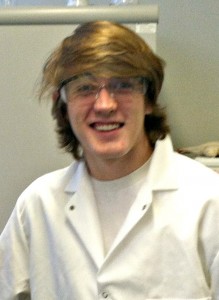
John Lawrence III
Major: ACS-Certified Chemistry
Graduation: Spring 2014
About Me: My current scientific interest lies in photochemistry and polymer chemistry. More specifically, I have become attracted to the growing field of organic electronics. Electronics have become extremely prevalent in today’s society, and introducing organic chemistry into the production of electronics would alleviate some of the burdens that the current materials used put on our environment. As a self-proclaimed “green” chemist, I am conscious of our effect on our planet. I would like to minimize the negative repercussions that the current production methods have environmentally by creating organic alternatives.
Research Project: My project aims to create photo-reactive polyelectrolyte multilayer films (PEMs) comprising charged polythiophene (PT) manufactured using layer-by-layer (LbL) assembly. By using polythiophene, we hope to produce semiconducting polymer films that are applicable to photolithography, the fabrication of printed circuit boards, and microelectronics. Our ideal application of the product would be the construction of photopatternable electronic materials.
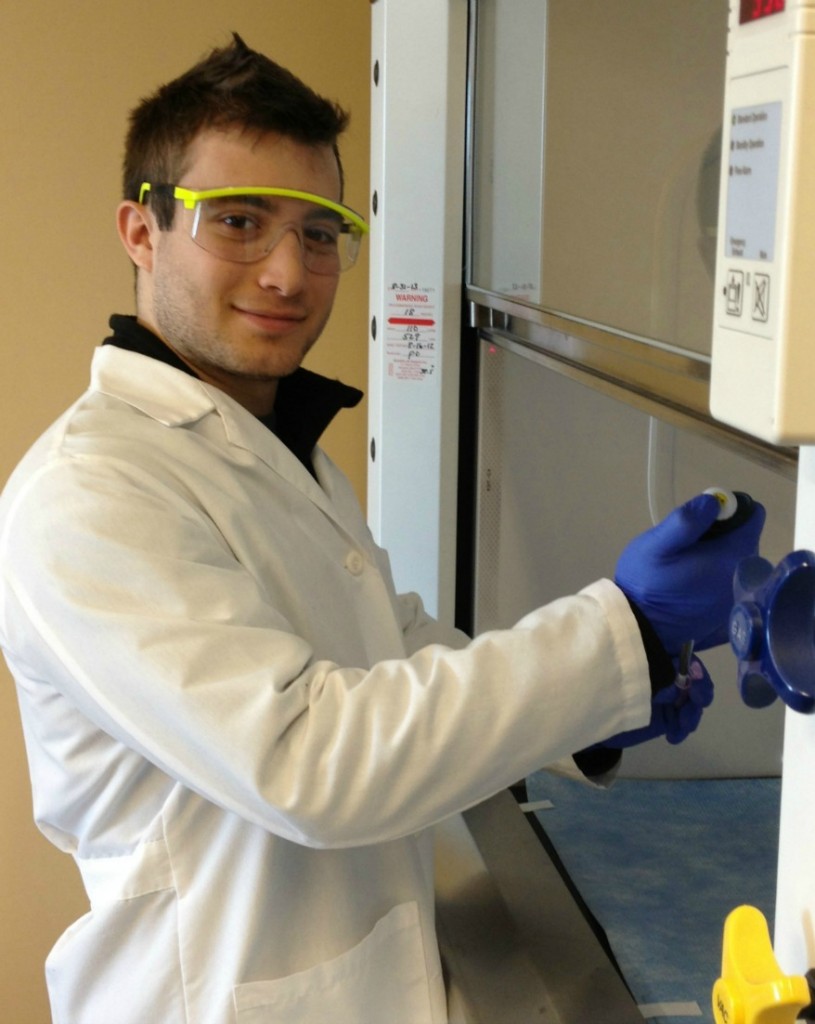
Elliot Philips
Major: Biology
Graduation: Spring 2014
About Me: I aspire to be a physician-scientist. My short-term goal as a Beckman Fellow is to contribute to the research efforts of the Freudenreich Lab in the hope of making discoveries that will ultimately impact Huntington’s disease and Amyotrophic Lateral Sclerosis (ALS) patients. My long-term goals include plans to apply to M.D./Ph.D. programs to launch my career in biomedical research.
Research Project: Expansion of DNA repeats cause a number of neurodegenerative diseases, such as Huntington’s disease, myotonic dystrophy, and most recently a newly discovered DNA repeat that is associated with 20-50% of Amyotrophic Lateral Sclerosis (ALS) and Frontotemporal Dementia (FTD) cases. The Freudenreich lab has developed a model system to study how these repeats expand and cause chromosome fragility using a yeast artificial chromosome that contains the human repeat expansion. My project will be to incorporate the ALS-causing repeat into this system, and optimize the assay for screens designed to identify genes and factors that influence repeat stability. This work will ultimately shed light on factors and pathways that influence the stability and fragility of the DNA repeats that cause Huntington’s disease and ALS.
 Katharine Bowers
Katharine Bowers
 Sarah Shnayder
Sarah Shnayder
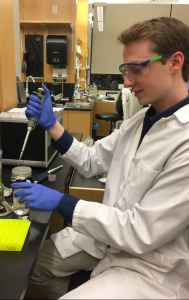 Charles Wollmuth
Charles Wollmuth














